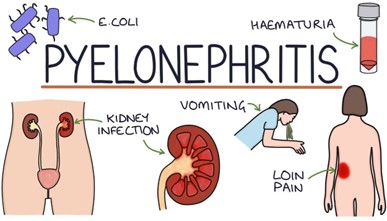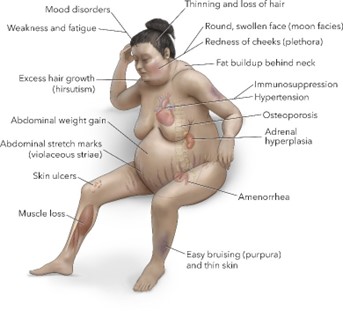Which finding by the nurse will be most helpful in determining whether a 67- yr-old patient with benign prostatic hyperplasia has an upper urinary tract infection (pyelonephritis)?
Costovertebral tenderness
Foul-smelling urine
Bladder distention
Suprapubic discomfort
The Correct Answer is A
The most helpful finding by the nurse in determining whether a 67-yr-old patient with benign prostatic hyperplasia has an upper urinary tract infection (pyelonephritis) would be
**costovertebral tenderness**⁴. This is because costovertebral tenderness is a common symptom of pyelonephritis⁵. Pyelonephritis is an infection of the upper urinary tract that can cause fever, chills, flank pain, nausea, vomiting, and costovertebral tenderness⁵. Foul-smelling urine and bladder distention are not specific symptoms of pyelonephritis⁵. Suprapubic discomfort can be a symptom of lower urinary tract infection⁵.

Nursing Test Bank
Naxlex Comprehensive Predictor Exams
Related Questions
Correct Answer is D
Explanation
Cushing syndrome is caused by excessive cortisol production by the adrenal glands, which can result in weight gain and redistribution of fat to the abdomen, giving it a characteristic rounded appearance.
The other options mentioned in the question are not typically associated with Cushing syndrome. Chronically low blood pressure is not typically seen in Cushing syndrome, as cortisol is a hormone that can raise blood pressure. A bronzed appearance of the skin is more commonly seen in conditions like Addison's disease, where there is a deficiency of cortisol. Decreased axillary and pubic hair is not a common finding in Cushing syndrome, although excessive hair growth (hirsutism) may occur due to the excess of androgens produced by the adrenal glands.

Correct Answer is A
Explanation
The nurse should anticipate that the patient will need to collect a stool specimen. Diarrhea can be caused by various factors such as infections, inflammatory bowel disease, food intolerance, and medication side effects. Collecting a stool specimen can help identify the underlying cause of the diarrhea and guide appropriate treatment. Blood cultures, colonoscopy but barium enema may be necessary in certain cases but are not typically the first step in the diagnostic process for diarrhea.
Whether you are a student looking to ace your exams or a practicing nurse seeking to enhance your expertise , our nursing education contents will empower you with the confidence and competence to make a difference in the lives of patients and become a respected leader in the healthcare field.
Visit Naxlex, invest in your future and unlock endless possibilities with our unparalleled nursing education contents today
Report Wrong Answer on the Current Question
Do you disagree with the answer? If yes, what is your expected answer? Explain.
Kindly be descriptive with the issue you are facing.
